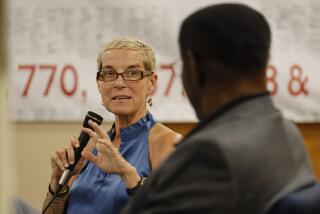Union Organizer, Songwriter John L. Handcox Is Dead at 88
- Share via
John L. Handcox, a union organizer and writer of songs that steeled the resolve of the American labor movement, is dead. A longtime resident of Southeast San Diego, Handcox died of cancer Sept. 18, his family said Thursday. He was 88.
A memorial service is scheduled for 2 p.m. Saturday at New Creation Church in Lemon Grove.
“We are going to celebrate the life of a man who spent his life working to better the lives of others,” said Handcox’s nephew Amos Johnson Jr., a minister at the church. “He was a champion of the working man’s cause.”
Handcox was born Feb. 5, 1904, near Brinkley, Ark., the son of poor tenant farmers. In 1935 he began writing protest songs and poems about the injustices and slavish working conditions forced upon his people by plantation owners.
He also organized local chapters of the newly formed Southern Tenant Farmers Union, encouraging tenant farmers, sharecroppers and day laborers to picket for their rights, then giving them strength by singing to them as they marched.
Because of his fiery determination and outspokenness, he was forced to flee the state in 1936, just a step ahead of a lynch mob. But he continued traveling the country and organizing workers.
During that time, Handcox wrote dozens of poems and songs, including “Roll the Union On,” “Raggedy, Raggedy Are We” and “There Is Mean Things Happening in This Land,” which have become staples of folk and labor songfests all over the world and were recorded by the Library of Congress.
“All these songs and poems is about the way people was being treated,” Handcox told The Times in a 1985 interview. “Singing is inspirational. More inspirational than talk. It arouses people more, makes them feel a part of things.”
After arriving in San Diego in 1942, Handcox peddled fish, eggs and fruit out of a truck, ran a small grocery store and restaurant and worked as a carpenter. For the next 40 years, as he and his wife, Ruth, raised their three daughters and a son, Handcox lived in obscurity. Many of those who strove to keep his songs alive, such as folk singers Pete Seeger and Woody Guthrie, lost track of him and assumed he was dead.
But in the mid-1980s, Seeger heard that Handcox was still alive, sought him out, and helped get him onto the bills of folk festivals, union gatherings and other events.
“His songs are going to be sung as long as there are Americans who remember American history,” Seeger said in a telephone interview from his Upstate New York home Thursday. “While this guy never sold millions of records like Michael Jackson, he may be remembered even longer because his songs filled a niche.”
Vera Motton, Handcox’s niece, said his rediscovery brought new joy to his life. “After that, he began to enjoy himself and realized the contribution that he made,” she said.
During the past decade, angered by the policies of President Reagan, Handcox resumed writing protest songs. He also maintained his union membership with the United Brotherhood of Carpenters and Joiners.
When Handcox wasn’t writing, he spent his time fishing and making wine, said Peter Brown, a friend of the Handcox family. Brown organized a moving tribute to Handcox in San Diego in February that brought together Seeger, other noted folk singers and members of Handcox’s church choir.
Handcox, who donated his body to science, is survived by his wife, four children and scores of grandchildren, great-grandchildren and great-great-grandchildren.
“I think it gave him a keen sense of satisfaction that people sang his songs,” Seeger said. “I told him that if he got paid for every time people sang ‘Roll the Union On’ he would be a rich man.”
But to Handcox, his songs were not about making money.
“Life is not a matter of money with me,” he said in the 1985 interview. “If my songs help make this a better world to live in, I think I did a lot.”
More to Read
Sign up for Essential California
The most important California stories and recommendations in your inbox every morning.
You may occasionally receive promotional content from the Los Angeles Times.













